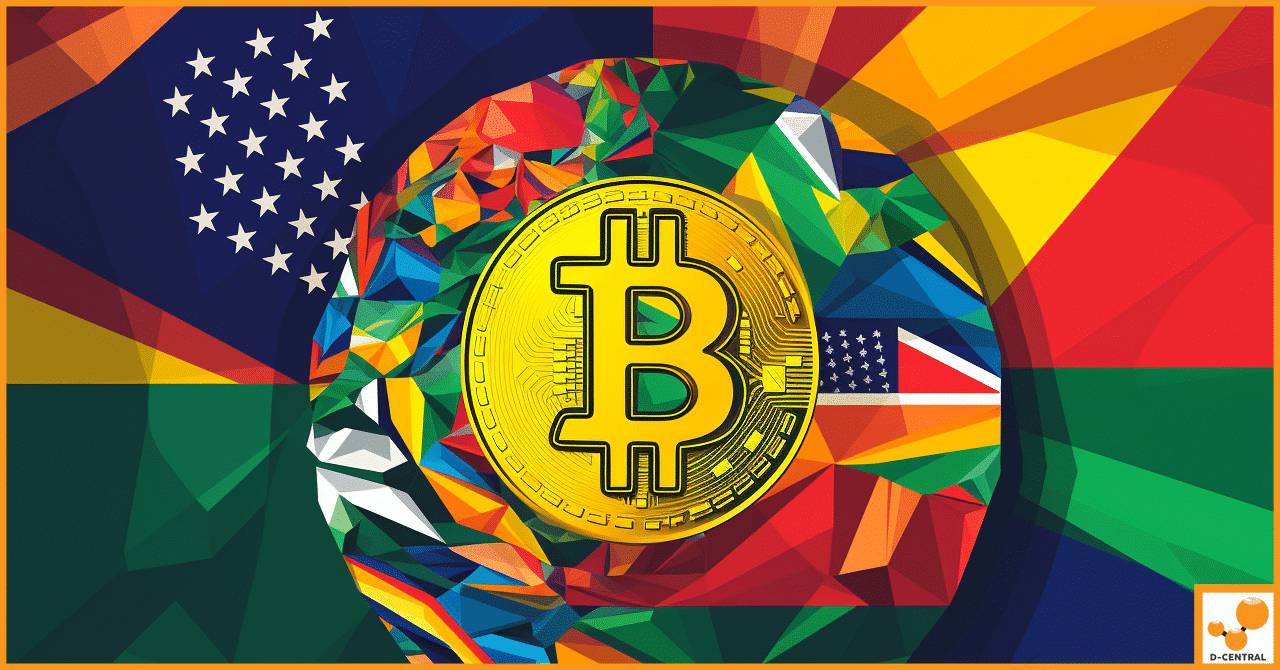
Star Wars, A Bitcoin Story – Episode II: Galactic Credits, Aurodium, and the Bitcoin Standard
As we continue to explore the intricate relationship between the Star Wars universe and the world of cryptocurrency, we delve
4479 Desserte Nord Autoroute 440, Laval, QC H7P 6E2

Welcome to a deep-dive exploration of a term that has been on everyone’s lips recently: BRICS. A dynamic and influential assembly of nations, BRICS consists of Brazil, Russia, India, China, and South Africa. This group is gaining increasing relevance in the global economy, and its potential impact on the Bitcoin and broader cryptocurrency space is significant.
As a Bitcoiner, you have probably followed the growing discourse surrounding the BRICS nations and their economic maneuvers. Given their ambition to form a robust, non-western-centric economic cooperation, the strategic decisions of these nations could have far-reaching implications for the current monetary status quo, and notably, for the U.S. Dollar (USD).
Given our deeply-held beliefs in the transformative power of Bitcoin and its potential to reshape the global financial order, understanding these geopolitical dynamics is more than just a matter of interest—it’s an integral part of our mission at D-Central Technologies. So, join us as we demystify the term BRICS, their economic objectives, and the potential role of Bitcoin in this rapidly evolving landscape.
Let’s start by decoding the term BRICS. BRICS is an acronym that represents five major emerging economies: Brazil, Russia, India, China, and South Africa. The term was first coined by Jim O’Neill, a Goldman Sachs economist, in 2001 as “BRIC,” representing the four initial countries—Brazil, Russia, India, and China. It was later transformed into BRICS with the inclusion of South Africa in 2010.
BRICS represents a powerful consortium of nations characterized by large, rapidly growing economies and significant influence on regional and global affairs. Collectively, these countries represent around 42% of the world’s population and approximately 23% of the global GDP, as of 2021.
The concept behind BRICS is that of a non-western-centric bloc—an economic alliance that seeks to decenter the traditionally Western-dominated global economic order. In simpler terms, the BRICS nations aim to form their own economic cooperation that doesn’t revolve around Western, and specifically U.S., influence.
This endeavor directly affects the status of the U.S. Dollar (USD) as the world’s leading reserve currency—a position it has held since the Bretton Woods Agreement in 1944. The BRICS nations seek to loosen the stronghold of the USD on international trade and finance, and this ambition is where our interest as Bitcoin and cryptocurrency enthusiasts come into play. As we move forward, we will delve into why BRICS countries want to reduce USD dependency, and how this shift aligns with the principles of Bitcoin maximalism and the cypherpunk ethos.
As we dig deeper, it becomes clear that the BRICS nations share a common objective: they want to reduce their dependency on the U.S. Dollar. Their reasons are multifaceted, with significant political and economic motivations underlying their strategic moves. However, two reasons, in particular, stand out and offer insight into their drive towards alternative monetary arrangements.
The U.S. Dollar and Economic Growth
Firstly, by continuing to use U.S. Dollars as the primary medium of exchange, the BRICS nations are, in essence, feeding the U.S. economic engine at the expense of their own growth. The need to hold and transact in USD exposes them to the financial and monetary policies of the U.S. Federal Reserve—policies over which they have no control, yet that significantly impact their economies. This imbalance forms a major part of the rationale for BRICS nations to explore alternative mediums of exchange.
The U.S. Dollar as a Reserve Asset
Secondly, the need for these countries to hold reserves of USD and U.S. Treasuries (USTs) as reserve assets is also a matter of concern. Any country wishing to conduct international trade must maintain significant reserves of USD, due to its status as the world’s leading reserve currency. This dependency ties them into the monetary policy of the U.S. and potentially exposes them to economic risk, should the value of the USD fall or U.S. economic policy negatively affect the value of their holdings.
The objectives of the BRICS nations are clear—they seek economic autonomy and security that’s not tied to the performance and policies of the U.S. economy. As we delve into the USD dilemma, we will unpack why these objectives align closely with the principles of Bitcoin maximalism and the wider cryptocurrency space.
The domination of the USD as the global reserve currency and primary medium of exchange is currently facing challenges on several fronts, leading to what we refer to as the “USD dilemma.” Two of the most pressing issues that have brought us to this juncture are sanctions and inflation.
Sanction Issues
The U.S., being the primary custodian of the USD and the global economic system, wields considerable power in implementing sanctions that can freeze assets and restrict access to global financial systems, including SWIFT, the worldwide money transfer system. A case in point is when the U.S. sanctioned Russia, freezing their USTs and cutting them off from SWIFT. This demonstration of power has brought to light the vulnerability of countries whose economies heavily rely on USD.
Inflation
Another aspect of the USD dilemma is inflation. In response to economic crises, the U.S. Treasury has repeatedly employed a strategy known as quantitative easing, which essentially involves printing more USD to buy its own debt. While this may provide short-term relief, the long-term consequence is an expanded money supply, leading to devaluation of the USD and inflation. For nations holding USTs or USD, this equates to a loss of purchasing power—essentially, their money is worth less over time.
Impact on BRICS Nations
The issues of sanctions and inflation pose significant problems for the BRICS nations. They face the risk of having their assets frozen and their economic activities curtailed, as seen in the case of Russia. Moreover, the continuing devaluation of the USD due to inflation reduces the value of their reserves and impacts the stability of their own currencies.
This state of affairs leads the BRICS countries to seek alternatives, with the objective of mitigating the risks associated with USD dependence. In the following section, we’ll delve into the alternative strategies that BRICS might adopt and the potential implications for Bitcoin and the broader cryptocurrency space.
To address the USD dilemma, the BRICS nations are exploring alternative strategies that could potentially shield them from U.S. economic policy and the uncertainties of the global financial system. These alternatives can be broadly categorized into three main options: using their own currencies, adopting a shared currency like the Chinese yuan, or turning to decentralized digital currencies like Bitcoin.
Using Their Own Currencies
One approach that the BRICS nations might consider is transacting in their own currencies. This would essentially involve trading with each other using a basket of their own national currencies, thereby circumventing the USD altogether. This strategy would significantly reduce their reliance on the USD and allow them greater control over their economic policies.
Adopting the Chinese Yuan
Another option that’s often discussed in economic circles is the adoption of the Chinese yuan as a shared currency within the BRICS bloc, similar to the role the Euro plays within the European Union. If implemented, this would not only help to decenter the USD, but it could also significantly elevate the status of the Chinese yuan on the global stage.
Turning to Bitcoin and Cryptocurrencies
The third and perhaps most radical option is the adoption of Bitcoin or other cryptocurrencies. As decentralized and borderless forms of money, cryptocurrencies like Bitcoin are free from the control of any single nation, making them an attractive alternative for nations looking to reduce their dependency on the USD.
Evidence of Strategy Implementation
There are already indications that the BRICS nations are taking steps towards these alternatives. Recently, the United Arab Emirates (UAE) and China made headlines when they settled a large natural gas trade deal in Chinese yuan, bypassing the USD altogether. While the UAE is not a BRICS nation, this action indicates a potential shift in global economic trends, highlighting the viability of these alternative strategies.
As we continue to observe these developments, we must consider the potential impact on Bitcoin and the broader cryptocurrency industry. It’s an exciting time for Bitcoin maximalists and cryptocurrency enthusiasts alike as we watch these potential shifts in the global economic order unfold.
If the BRICS nations successfully achieve their objective of decoupling from the USD, it could have profound implications for the U.S. and the global economy.
Diminishing USD Dominance
A successful departure from the USD by BRICS could potentially lead to a diminishing dominance of the USD on the global stage. This could mean a reduced role of the USD as the primary medium of exchange and global reserve currency, as nations, especially those in the BRICS bloc, would potentially no longer require large reserves of USD for their economic operations. This shift could fundamentally alter the dynamics of the global economy and reshape international trade relations.
Global Economic Rebalancing
A rebalancing of global economic power could also be on the horizon. If the BRICS nations successfully implement an alternative to the USD, it could empower other countries to do the same, potentially leading to a more multipolar global economy. This would represent a significant shift away from the U.S.-centric model that has dominated since the end of the Second World War.
BRICS GDP Surpasses G7
Supporting this potential shift is a recent economic trend: the GDP of the BRICS nations recently surpassed that of the G7 countries. This development signifies an essential moment in the realignment of global economic power. The rising economic prowess of the BRICS nations cannot be ignored and further underscores the potential impact of their departure from the USD.
As the BRICS nations inch towards their objective of decreasing reliance on the USD, questions naturally arise about the future of the USD as the global reserve currency. Could these nations cause the USD to lose its status? Let’s delve into this discussion further.
The Potential Shift in Reserve Currency Status
The USD has held the title of global reserve currency since the mid-20th century, largely due to the size and strength of the U.S. economy and the stability of its political system. However, the recent maneuvers by the BRICS nations could present a significant challenge to this status quo.
If the BRICS nations, collectively representing a substantial portion of the world’s economy, decide to transition away from the USD in favor of their own currencies, a shared currency like the Chinese yuan, or even decentralized digital currencies, it could seriously challenge the USD’s status as the global reserve currency.
Decline in the UST’s Dominance
Parallel to this potential shift in the global reserve currency is a noticeable decline in the dominance of U.S. Treasury securities (USTs) as the global reserve asset. This is particularly notable among the BRICS nations.
In response to U.S. sanctions, Russia sold their USTs. China has been unwinding theirs, and Japan has reduced their UST holdings to stabilize their own currency. As a result, foreign ownership of USTs has seen a significant decrease over the last decade.
This trend indicates that the role of USTs as the preferred global reserve asset is under threat. Combined with the potential challenge to the USD as the global reserve currency, we are witnessing possible monumental shifts in the global economic landscape.
The world is witnessing a potential tectonic shift in the global economic order. The BRICS nations—Brazil, Russia, India, China, and South Africa—are seeking to reduce their dependency on the USD and U.S. Treasury securities, and this could have profound implications for the future of the global economy.
The possible alternatives they are exploring—whether it’s using their own currencies, adopting a shared currency like the Chinese yuan, or even embracing decentralized digital currencies like Bitcoin—highlight the changing dynamics in global economic power.
Moreover, these developments could impact the future of Bitcoin and the broader cryptocurrency industry. As these nations consider alternatives to the USD, the role of Bitcoin and other cryptocurrencies could potentially become more prominent.
At D-Central, we stand ready to help you navigate these uncertain times. Whether you are a do-it-yourself miner needing parts and maintenance training, or a business requiring comprehensive mining support and outsourcing solutions, D-Central is your go-to expert in the Bitcoin mining industry.
Contact us today to learn more about our services and how we can assist you in optimizing your Bitcoin mining operations. Together, we can harness the power of Bitcoin and shape the future of the decentralized digital economy.
What does the term ‘BRICS’ stand for?
BRICS is an acronym for five major emerging national economies: Brazil, Russia, India, China, and South Africa.
Why do the BRICS nations want to reduce their dependency on the USD?
There are several reasons, but two main ones are: a) continued use of USD as the primary medium of exchange feeds the US economic engine at the expense of their own economic growth; and b) needing USDs for transactions forces these countries to hold reserves of USD and U.S. Treasury securities, which can be subject to U.S. sanctions and inflation.
What alternatives are the BRICS nations considering to the USD?
The BRICS nations are considering using their own currencies, adopting a shared currency like the Chinese yuan, or even embracing decentralized digital currencies like Bitcoin.
What evidence is there that the BRICS nations are moving away from the USD?
Recent developments like Russia selling their U.S. Treasury securities and the United Arab Emirates settling a large natural gas trade with China in yuan indicate a gradual shift away from the USD.
Could the BRICS nations cause the USD to lose its status as the global reserve currency?
While it’s still too early to definitively say, the collective economic power of the BRICS nations could potentially pose a challenge to the USD’s status as the global reserve currency.
What is the status of U.S. Treasury securities as a global reserve asset?
U.S. Treasury securities have been the preferred global reserve asset for many years. However, their dominance is seeing a decline, particularly among the BRICS nations.
What could be the implications for Bitcoin if BRICS move away from the USD?
The move away from the USD could potentially increase the prominence of Bitcoin and other cryptocurrencies, especially if these nations consider them as viable alternatives to the USD.
How has the GDP of BRICS nations changed compared to G7 countries?
Recently, the combined GDP of BRICS nations surpassed that of G7 countries, indicating a significant shift in global economic power.
What is the role of D-Central in the Bitcoin mining industry?
D-Central provides a wide range of Bitcoin mining services, from sourcing mining hardware and hosting mining operations to ASIC repairs and comprehensive mining support.
How can I avail D-Central’s services for Bitcoin mining?
You can contact D-Central directly to learn more about their services and how they can assist in optimizing your Bitcoin mining operations.
DISCLAIMER: D-Central Technologies and its associated content, including this blog, do not serve as financial advisors or official investment advisors. The insights and opinions shared here or by any guests featured in our content are provided purely for informational and educational purposes. Such communications should not be interpreted as financial, investment, legal, tax, or any form of specific advice. We are committed to advancing the knowledge and understanding of Bitcoin and its potential impact on society. However, we urge our community to proceed with caution and informed judgment in all related endeavors.
Related Posts

As we continue to explore the intricate relationship between the Star Wars universe and the world of cryptocurrency, we delve

Bitcoin, the first and most prominent cryptocurrency, has revolutionized the financial landscape since its inception in 2009. At the heart

In the dynamic world of cryptocurrencies, Bitcoin stands as a colossus, both in terms of its market value and its